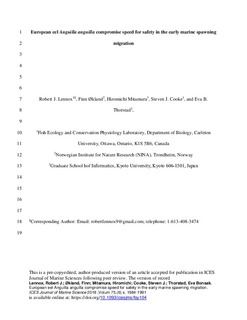European eel Anguilla anguilla compromise speed for safety in the early marine spawning migration
Journal article, Peer reviewed
Accepted version

Åpne
Permanent lenke
http://hdl.handle.net/11250/2580531Utgivelsesdato
2018Metadata
Vis full innførselSamlinger
- Publikasjoner fra CRIStin - NINA [2364]
- Scientific publications [1392]
Sammendrag
There are substantial benefits to potential fitness conferred to animals that undertake migrations. However, animals must make compromises to maximize survival and compensate for the risks associated with long-distance movement. European eel (Anguilla anguilla), a migratory catadromous fish, has undergone population declines owing to changes in marine and freshwater habitat and interactions with human infrastructure, instigating research to investigate the mechanisms controlling their migration. Yellow-phase European eels from the local River Opo and silver-phase European eels transplanted from River Imsa, Norway, were implanted with acoustic transmitters and released within a network of receiver stations in the Hardangerfjord, Norway. Silver-phase eels exhibited more movement within the array than yellow-phase eels, signifying the onset of migration. Silver-phase eels moved through the fjord nocturnally, arriving at gates predominantly at night. Eels had slower rates of migration than expected based on models predicting continuous movement, suggesting that movement ceased during daylight hours. Reduced net rates of travel supported the hypothesis that eels compromise speed for safety during the early marine migration by avoiding predators and not actively migrating during daylight. The silver eels were capable of directed movement towards the ocean and were not recorded by receivers in bays or dead ends. European eels must successfully transit this coastal zone, where their residence is prolonged because of the relatively slow speeds. These results suggest that the early marine phase of the European eel spawning migration be a focal period for European eel conservation efforts. asset protection principle, conservation behaviour, exploitation, fjord, telemetry